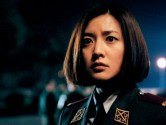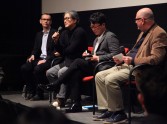
Park Chan-wook.
Two History Lessons
A leading figure of the Korean New Wave that crested in the 1990s, Park Chan-wook (b. 1963) remains among the most celebrated and popular Korean filmmakers active today. Beginning with his critical and commercial breakthrough Joint Security Area (or JSA), each of Park’s eagerly-awaited films have been greeted as major cultural events and milestones. From JSA’s bold depiction of tensions between North and South Korea to the elaborate and violent retributions shared by his iconic “Vengeance Trilogy” (Sympathy for Mr. Vengeance, Oldboy and Lady Vengeance), Park’s major films have burrowed deep into the popular imagination, not just in Korea, but around the world, and especially in the U.S., where they have been embraced and often openly imitated by diverse filmmakers such as Quentin Tarantino and Spike Lee, who went as far as to remake Oldboy.
In coordination with a new course Carter Eckert and Alexander Zahlten are teaching this semester — "Frames in Time: Korean Cinema as History and Filmmaking”— the Harvard Film Archive presents two important films by Park Chan-wook, which both represent different stages in his filmmaking and reflect upon different chapters of Korean history: JSA and the more recent The Handmaiden, a psychosexually-charged return to the dark years of Japanese colonial rule over Korea.
While Park’s cinema is better known for its inventive style, black humor and unsettling imagery, these two films reveal another, more ruminative and politically astute side to Park’s mode of filmmaking with their interweaving of a critical address of history into their inventive reinvention of popular film genres. – Haden Guest
On Tuesday March 5 at 5pm, the HFA will host a conversation between the director and Carter Eckert and Alexander Zahlten from Harvard’s East Asian Languages and Civilizations Department. Admission is free and tickets will be available on a first come, first served basis beginning at 4:15pm that day at our box office.











